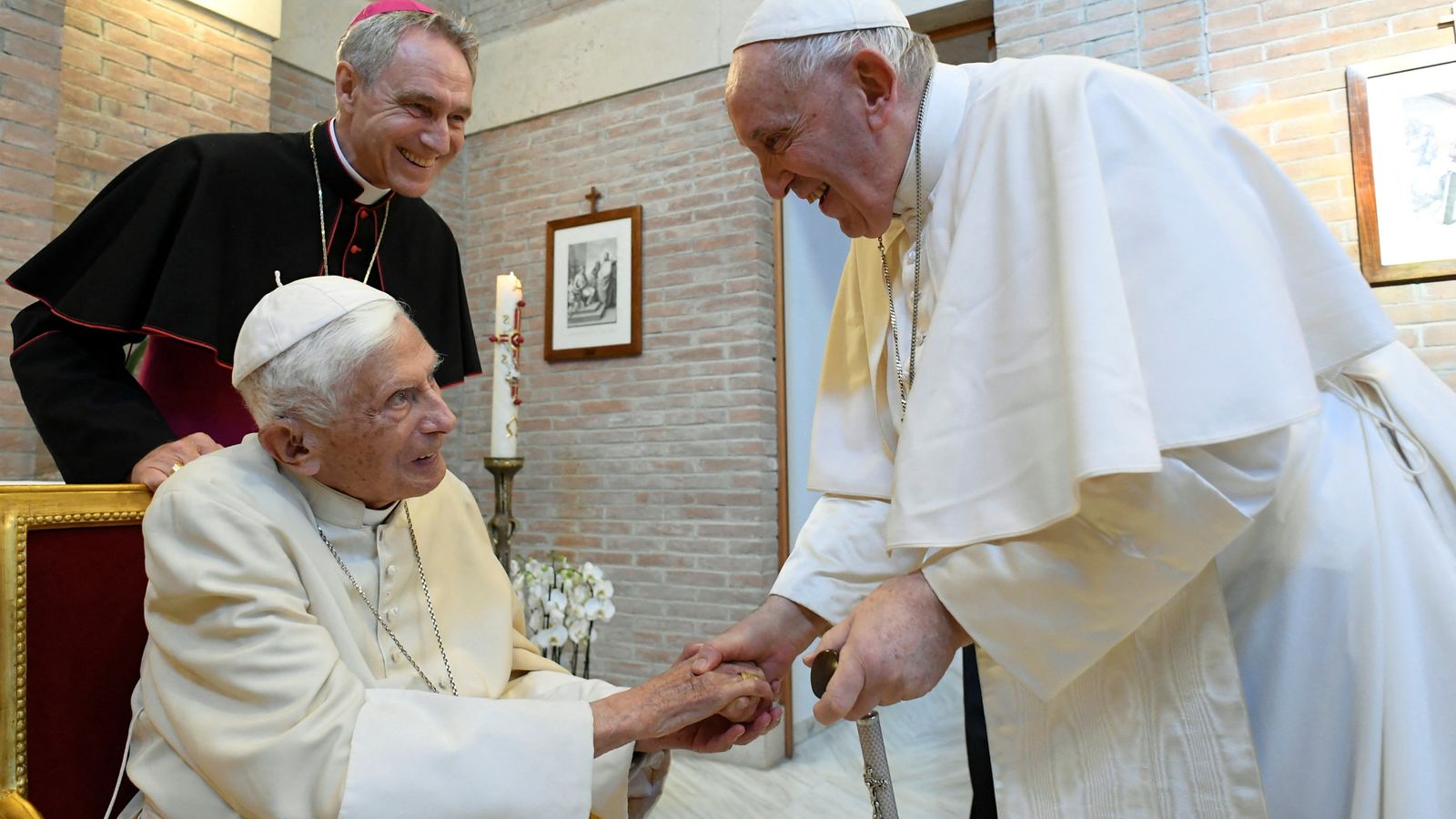After a month of economic pledges and screeching U-turns in Westminster, the focus turned this week to one policy in particular – the pensions triple lock.
The long-term manifesto commitment of the Conservative Party appeared to be under threat after days of ministers – including the new chancellor – being unable to promise the government would stick to it.
But in a surprise moment during Wednesday’s Prime Minister’s Questions, just hours after her foreign secretary avoided any pledge, Liz Truss told MPs: “I’m completely committed to it – so is the chancellor.”
So, what is the pensions triple lock? And how did we get here? We give you the facts about the policy and the rocky road it has been on under the new PM.
Politics live: Tory MP says Truss’s position ‘increasingly untenable’
What is the triple lock on pensions?
The triple lock is a government policy designed to ensure people’s pensions are not impacted by gradual rises in the cost of living over time.
In practice, it means that the state pension must rise by whichever of the following three things is highest:
The government usually compares the three rates in September, before implementing the correct rise the following April.
What is the history of the policy?
The measure was introduced by the Conservative and Liberal Democrat coalition government after they took office in 2010.
At the time, pensioner poverty was a big problem for the UK. And, as it happened, many Tory voters fell into the older age bracket.
The chancellor at the time, George Osborne, said bringing in the policy would see pensioners “have the income to live with dignity in retirement”.
Since then, it has been a staple of every Conservative manifesto – including Boris Johnson’s ahead of the last election in 2019.
The only time it has been paused since its inception was in September 2021 due to COVID.
Because of people earning much less during the lockdowns of 2020, there was a big leap in average earnings of 8% come 2021 as people returned to work.
But with the debt the government had racked up during the pandemic, it feared raising pensions at the same rate would be too expensive for the Treasury’s coffers.
Then work and pensions secretary Therese Coffey confirmed the triple lock would be suspended for a year, but reintroduced for the financial year starting April 2023.
The Office for National Statistics (ONS) confirmed on Wednesday that the consumer price index (CPI) showed September 2022’s rate of inflation was 10.1%.
This would make it the highest of the three metrics for next year’s pension increase by far, therefore to stick to the triple lock, the government would need to raise the state pension by 10.1% come April.
Please use Chrome browser for a more accessible video player
Why is everyone talking about it again?
Reams of new government policy ended up on the bonfire last week following the entrance of new Chancellor Jeremy Hunt in his attempt to calm the markets after the disastrous mini-budget last month.
But questions remained over what else could follow as he warned of “more difficult decisions” ahead on tax and spending.
During her leadership campaign, Liz Truss told a Tory hustings she would be “fully committed” to the pensions triple lock if she was to win the keys to Downing Street, and two weeks ago, she reiterated her promise.
But the pledge was cast into doubt on Monday when Mr Hunt could not make the same commitment during an interview with Sky News’ political editor Beth Rigby, saying everything was on the table when it came to possible cuts to cover the fiscal blackhole in Whitehall.
And on Tuesday, the PM’s official spokesperson reignited speculation when he said Number 10 was “not making any commitments” on the pensions triple lock before 31 October – when Mr Hunt delivers his medium term fiscal plan.
From the government’s side, getting rid of the triple lock would save the Treasury billions.
In fact, the Resolution Foundation think tank said linking state pension increases to the lower rate of average earnings, around 5.5%, rather than inflation, would save £5.6bn next year.
But charities warned the impact on poorer pensioners, who are facing soaring food and energy bills amid the cost of living crisis, could be huge.
Age UK’s charity director Caroline Abrahams said: “Knowing their state pension would keep pace with rising prices because of the triple lock has given precious hope to many older people at a time of great anxiety.
“For the government to take that away from them now would be a hammer blow, as well as a flagrant breach of trust.”
As speculation grew the triple lock could be scrapped, MPs began to express their anger, including on the Conservative benches.
Maria Caulfield said she would not vote to end it, tweeting: “Pensioners should not be paying the price for the cost of living crisis whether caused by the war in Ukraine or mini budgets.”
Her message was shared by her colleague Steve Double, who simply wrote: “Nor me.”
And Conservative peer Baroness Ros Altmann told the BBC it would be “unforgivable” for the government not to stand by its policy.
Please use Chrome browser for a more accessible video player
What happened today?
Foreign Secretary James Cleverly was sent out on the airwaves on Wednesday morning as rumours were rife the triple lock was for the scrapheap.
Pushed on the issue by Sky News’ Kay Burley, he still would not make the pledge, saying: “We do take manifesto commitments incredibly seriously, but what I’m not going to do is pre-announce budget measures.”
But, just a few hours later, Ms Truss confirmed she and Mr Hunt were committed to the measure.
Answering a question from the SNP’s Westminster leader, Ian Blackford, during Prime Minister’s Questions, she said: “We’ve been clear in our manifesto that we will maintain the triple lock and I’m completely committed to it – so is the chancellor.”
And her official spokesman confirmed after that Numbers 10 and 11 Downing Street were firmly aligned on the issue.
The turmoil of recent weeks has led to much uncertainty around the sell-by-dates of government policies and the warnings are stark about the tough choices ahead.
But it appears the PM and her new chancellor have now agreed this particular Tory pledge is worth saving.








